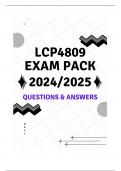lOMoAR cPSD| 18998289
, lOMoAR cPSD| 18998289
UNIVERSITY EXAMINATIONS
Oct/Nov 2023
LCP4809
Education Law
100 Marks
Duration FOUR (4) Hours
First examiner: Ms M Ehrenbeck
Second examiner: Adv NC Malatsi
This paper consists of 8 pages.
Instructions:
1. The examination question paper counts 100 marks.
2. It consists of four (4) questions. Answer ALL the questions.
3. The duration of the examination on the timetable is four (4) hours.
4. In addition to the duration of the examination indicated on the timetable, you are
given 30 minutes to FINALISE the uploading of your exam file. Your exam file
must be uploaded via the myExams platform on 25 October
2023 BEFORE 18:45 (South African Standard Time).
5. This is an open-book examination. You may consult your prescribed study material during
the examination.
6. This examination is proctored via the Invigilator App. You are required to activate (or log in
to) the Invigilator app between 14:00 and 14:45 (South African Standard Time).
The QR code is below:
, lOMoAR cPSD| 18998289
Question 1
Write an essay in which you discuss the role of the public school in the South African
education system. Pay particular attention to the critical function of the governing body
in providing quality education to all the learners in the school.
(25)
The Role of Public Schools in the South African Education System
Public schools in South Africa play a crucial role in providing education to the majority
of learners across the country. These schools operate within the framework of the
government’s national education policy and are intended to serve learners from
various socio-economic backgrounds, with the goal of promoting inclusivity, equity,
and the development of a skilled and knowledgeable population. The role of public
schools in the South African education system extends beyond the classroom, as
they also play a fundamental role in social development, promoting democratic
values, and preparing learners to participate actively in the economy. This essay will
discuss the role of public schools and the critical function of the governing body in
ensuring the provision of quality education to all learners.
The Role of Public Schools in South Africa
Public schools are tasked with several important roles that shape the nation’s future.
First and foremost, public schools provide access to basic education for all learners,
regardless of their background. According to the South African Constitution, every
child has the right to a basic education, and public schools are the primary
mechanism through which this right is realized. The government, through public
, lOMoAR cPSD| 18998289
schools, ensures that education is available and accessible to children in both urban
and rural areas, thereby promoting equality.
Moreover, public schools play a critical role in reducing the socio-economic disparities
in the country. South Africa has a deeply unequal society, with stark contrasts in
wealth and resources across different communities. Public schools offer an
opportunity for children from disadvantaged backgrounds to receive an education that
equips them with the skills needed to improve their circumstances. Public education
helps foster social mobility and can break the cycle of poverty by offering learners the
tools to access higher education and better employment opportunities.
Additionally, public schools are an important platform for promoting social cohesion
and national unity. South Africa is a diverse country with various cultural, linguistic,
and religious groups. Public schools, by their nature, are inclusive spaces where
learners from different backgrounds interact, learn from one another, and develop a
shared sense of identity. This fosters mutual respect and understanding, which is
essential for the continued development of a cohesive and democratic society.
The Critical Function of the School Governing Body
One of the most important components of public schools in South Africa is the School
Governing Body (SGB). According to the South African Schools Act of 1996, every
public school must have an SGB, which is responsible for ensuring that the school is
well-managed and that learners receive quality education. The SGB is made up of
various stakeholders, including parents, teachers, non-teaching staff, and, in
secondary schools, learners. This diverse representation ensures that the interests of
all parties involved in the education process are considered.
The SGB plays a critical role in the governance and functioning of public schools,
with its responsibilities extending to several key areas:




